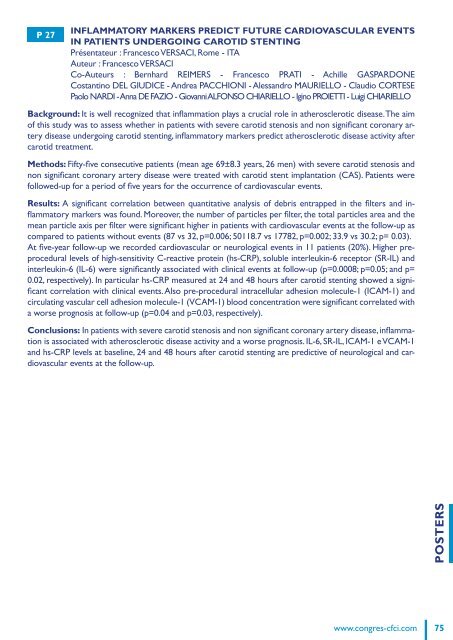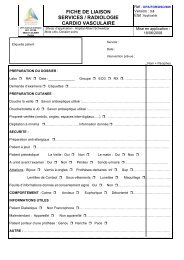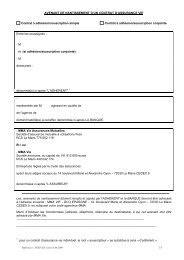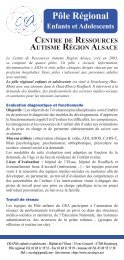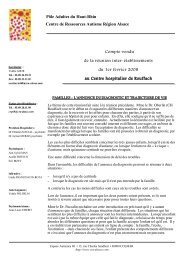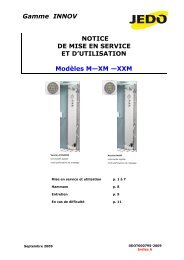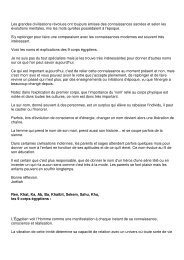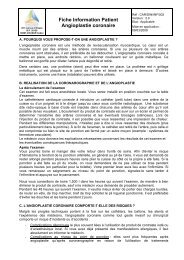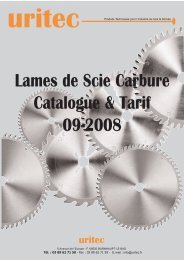Francophone - Webagoo.eu
Francophone - Webagoo.eu
Francophone - Webagoo.eu
You also want an ePaper? Increase the reach of your titles
YUMPU automatically turns print PDFs into web optimized ePapers that Google loves.
P 27<br />
INFLAMMATORY MARKERS PREDICT FUTURE CARDIOVASCULAR EVENTS<br />
IN PATIENTS UNDERGOING CAROTID STENTING<br />
Présentat<strong>eu</strong>r : Francesco VERSACI, Rome - ITA<br />
Aut<strong>eu</strong>r : Francesco VERSACI<br />
Co-Aut<strong>eu</strong>rs : Bernhard REIMERS - Francesco PRATI - Achille GASPARDONE<br />
Costantino DEL GIUDICE - Andrea PACCHIONI - Alessandro MAURIELLO - Claudio CORTESE<br />
Paolo NARDI - Anna DE FAZIO - Giovanni ALFONSO CHIARIELLO - Igino PROIETTI - Luigi CHIARIELLO<br />
Background: It is well recognized that inflammation plays a crucial role in atherosclerotic disease. The aim<br />
of this study was to assess whether in patients with severe carotid stenosis and non significant coronary artery<br />
disease undergoing carotid stenting, inflammatory markers predict atherosclerotic disease activity after<br />
carotid treatment.<br />
Methods: Fifty-five consecutive patients (mean age 69±8.3 years, 26 men) with severe carotid stenosis and<br />
non significant coronary artery disease were treated with carotid stent implantation (CAS). Patients were<br />
followed-up for a period of five years for the occurrence of cardiovascular events.<br />
Results: A significant correlation between quantitative analysis of debris entrapped in the filters and inflammatory<br />
markers was found. Moreover, the number of particles per filter, the total particles area and the<br />
mean particle axis per filter were significant higher in patients with cardiovascular events at the follow-up as<br />
compared to patients without events (87 vs 32, p=0.006; 50118.7 vs 17782, p=0.002; 33.9 vs 30.2; p= 0.03).<br />
At five-year follow-up we recorded cardiovascular or n<strong>eu</strong>rological events in 11 patients (20%). Higher preprocedural<br />
levels of high-sensitivity C-reactive protein (hs-CRP), soluble interl<strong>eu</strong>kin-6 receptor (SR-IL) and<br />
interl<strong>eu</strong>kin-6 (IL-6) were significantly associated with clinical events at follow-up (p=0.0008; p=0.05; and p=<br />
0.02, respectively). In particular hs-CRP measured at 24 and 48 hours after carotid stenting showed a significant<br />
correlation with clinical events. Also pre-procedural intracellular adhesion molecule-1 (ICAM-1) and<br />
circulating vascular cell adhesion molecule-1 (VCAM-1) blood concentration were significant correlated with<br />
a worse prognosis at follow-up (p=0.04 and p=0.03, respectively).<br />
Conclusions: In patients with severe carotid stenosis and non significant coronary artery disease, inflammation<br />
is associated with atherosclerotic disease activity and a worse prognosis. IL-6, SR-IL, ICAM-1 e VCAM-1<br />
and hs-CRP levels at baseline, 24 and 48 hours after carotid stenting are predictive of n<strong>eu</strong>rological and cardiovascular<br />
events at the follow-up.<br />
POSTERS<br />
www.congres-cfci.com<br />
75


